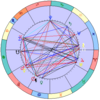
Retrograde truly works wonders. According to the laws of nature, planets of Solar system move in their orbit at the same speed. But if you look at them from the Earth, then their movement ceases to be uniform.
 Please wait
Please wait 
Retrograde truly works wonders. According to the laws of nature, planets of Solar system move in their orbit at the same speed. But if you look at them from the Earth, then their movement ceases to be uniform.
In sidereal astrology, there is a branch called "13 sign astrology". This is the only fork of science that considers Ophiuchus as a ecliptical constellation. My astrological service is built on this system, whose zodiacal signs completely coincide with astronomical constellations. But why does 12 sign tropical astrology use Ophiuchus?

The presence of Ophiuchus on the ecliptic circle is a well-known fact. It's located between Sagittarius and Scorpio, and, according to the established opinion, is either completely or partially absorbed by Scorpio constellation. However, if you look closely at the map of the celestial sphere, you may be surprised to find that Ophiuchus covers the ecliptic much more than Scorpio. This means that the Sun stays in this constellation for a long time - in fact, 18 days a year. And, given the astrological principle that the energy of the constellations affects the inhabitants of the Earth, we can conclude that Ophiuchus persons are born much more often than Scorpios ones. But how can we adapt the astrological knowledge accumulated over the centuries to interpret the new constellation of the Zodiac? Maybe we can fill in the missing gaps with the help of Ophiuchus? Let's figure it out.